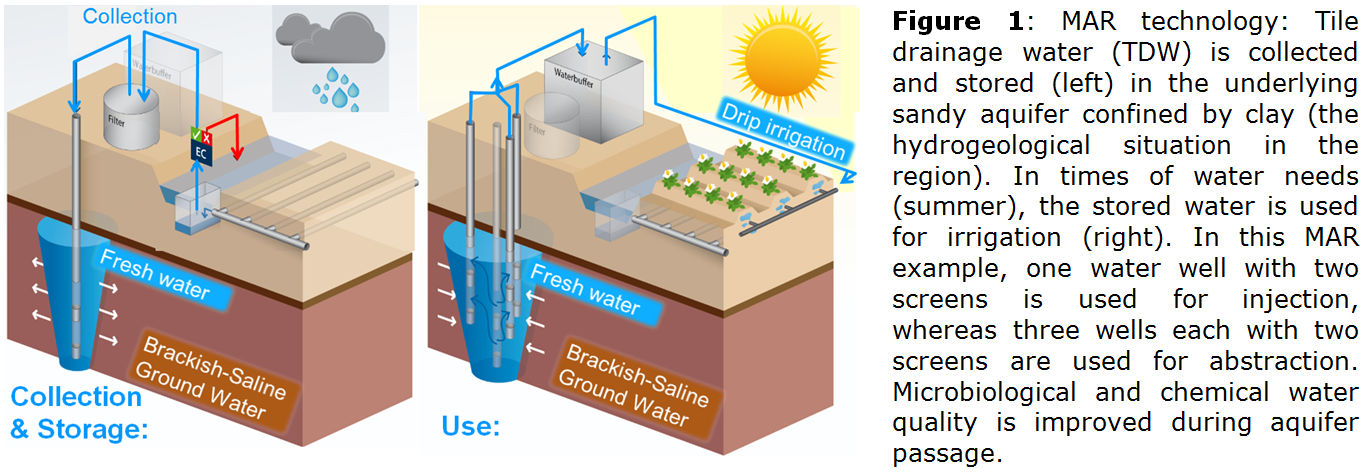Agriculture & Managed Aquifer Recharge (AGRIMAR): Drainage Water Recycling for Irrigation and Surface Water Quality Protection
Research objectives
Agricultural Managed Aquifer Recharge is a promising method for securing water availability and economic gain in the agricultural sector. However, the risk of groundwater pollution with agrochemicals during storage in aquifers is currently unknown. The research objectives of this study are:
- What conditions/processes control subsurface water treatment of pesticides and nutrients?
- What is the optimal MAR design and operation for water treatment of pesticides and nutrients?
Project outline
Introduction
Flourishing agricultural areas are essential for food security and economic growth of the cities they sustain. AGRIMAR presents an innovative and interdisciplinary approach to achieve sustainable agriculture under climate change in saline deltas of the Netherlands and elsewhere. AGRIMAR aims to provide solutions for two major agricultural water problems:
- Surface water carries plant pathogens causing diseases such as brown rot to (seed) potatoes and flower bulbs; its use for irrigation is prohibited or unwanted.
- Brackish groundwater and climate change further deteriorate fresh water availability.
AGRIMAR aims to provide solutions for two major agricultural water problems: investigates managed aquifer recharge (MAR) technology that collects fresh tile drainage water for storage in aquifers, and retrieves it in summer for crop irrigation (Figure 1).

This nature based solution secures water availability, recycles water and nutrients, improves surface water quality, and yields economic gain. However, major research gaps are the (predictive) understanding of the conditions and processes improving both chemical and microbiological water quality in MAR. Water and agricultural legislations require this research to minimize risks of groundwater pollution and pathogen outbreaks.
The AGRIMAR research is conducted by two PhD studies. My PhD research is focussed on water quality treatment during agricultural MAR. I work in close collaboration with Carina Eisfeld (the second PhD in the AGRIMAR research). Carina’s research is focussed on pathogen risk assessment of agricultural MAR systems.
Approach
My research is divided in three subtopics:
- Aquifer reactivity
The fate of agrochemicals in the subsurface depend on the reactivity of the aquifer. Processes expected in the subsurface are degradation and sorption. This occurs during aquifer-groundwater interactions in the aquifer. The aquifer reactivity will be studied in-situ using push‑pull tests combined with reactive transport modelling. - MAR performance
An agriculture MAR system will be monitored for 2 years. The monitoring is focused on tracking the fate of agrochemicals in the MAR system. In collaboration with Carina Eisfeld (PhD AGRIMAR – Plant pathogens) a MAR water quality and pathogen fate coupled density-dependent groundwater flow and biogeochemical reaction model will be built. The model will be used to optimize MAR system construction, application and treatment. - MAR prognosis
Regional scale-variations of physical and geochemical aquifer properties will result in differences in MAR performance. In this subject the MAR performance is assessed on regional-scale. By assessing the differences in aquifer properties, feasibility maps can be developed. These maps will indicate areas which are especially favourable or less well suited for agricultural MAR systems.
Scientific relevance
Whereas insight in physical water quantity aspects of MAR has recently made progress, (predictive) understanding of the biogeochemical and (micro)biological water quality aspects is limited, especially for this novel MAR application using abundant available TDW. The following research gaps are identified and addressed:
- What conditions/processes control subsurface water treatment of pesticides and nutrients?
- What is the optimal MAR design and operation applying the developed reactive transport model?
- What is the projected variation of MAR performance at regional-scale?
Social relevance
Fresh water is a scarce resource and especially in saline deltas like the Netherlands water availability for irrigation is limited. AGRIMAR proposes a local MAR system to secure fresh water with good water quality for agriculture. Therefore, the project faces a worldwide problem and we try to determine the conditions needed to apply the system for various environmental conditions. By providing pathogen free irrigation the spread of plant diseases will be reduced and loss of food crops is prevented.